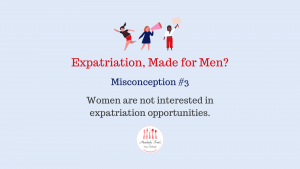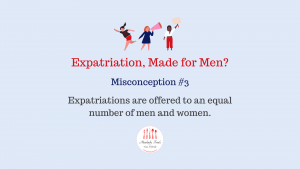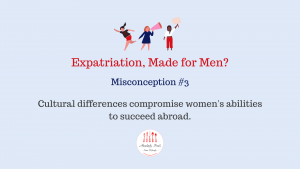Expatriation: Made for Men?
Is expatriation a man’s world? Why?
« This opportunity is a gift » Ana confided in me a while ago.
I 100% agree with her! All of my years abroad have assured me sure of this.
The only downside is that expatriation can often feel like a man’s world. At first glance, it may even appear to be much more adapted to men. Much like in many other parts of the job world, there is still work to be done.
« 80% of assignments abroad are offered to men. «
According to a BGRS study in Europe, 69% of women face more obstacles than their me colleagues before accepting an expatriation.
Far from trivial, these difficulties obstruct women’s success in companies more generally too. Essentially, access to strategic positions require skills and experiences which are generally acquired thanks to international mobility. Expatriation is therefore a way for talent acquisition experts to detects high-potential talents, and for employees to grow their skillset, and women are missing out!
Although women today are much more likely to work, they make up only 20% of employees based abroad. An astonishing gap, especially given the fact that studies repeatedly find the performance of female expatriates to be equal to that of their male counterparts. Moreover, they are in no way more likely to cut an expatriation short than men are.
Made for men? Why are there so few female expatriates?
Discussions around female expatriates date back almost 40 years. In 1986, Wall Street Journal journalists proposed a theory: the glass ceiling; within a hierarchy, the highest levels of power and responsibility remain closed to certain groups of people.
In the article, this expression was used to highlights the difficulties encountered by women trying to access higher-up positions at work.
So, beyond a certain level, women are blocked in their career progression. Organisations become accustomed to « counting on » their male employees, slowing down the career and development opportunities available to women. An absence of opportunities for women to acquire experience abroad is symptomatic of this issue.
Made for men? Let’s Shatter the Glass Ceiling!
According to studies, female expatriates have proven that they adapt more easily than men. However, in order to be able to demonstrate this unparalleled adaptability, women need access to opportunities for international mobility. To do this, we must overcome 3 key preconceived ideas…

Idea n° 1 : Women are not interested in expatriation.
The inequalities present within societies reverberate throughout the world of work and, consequently, affect international mobility.
Ezgi, a young expatriate we met at Absolutely French, observed that: « when a women is married and has children, we think, mistakenly, that she can’t take on an expatriation because she would be spread too thinly between work and family life. Generally, preconceived ideas about women are an obstacle to expatriation. »
When offered a position abroad, women are more likely to think it through about it than men. Issues of uprooting one’s family, being far from loved ones, and managing daily life in an unfamiliar country are considered more carefully. On top of this, women are more likely to question their legitimacy, their skills, and their ability to succeed during an assignment abroad, whilst men are less inclined to be held back by the risks, and more likely to focus on the opportunities.
Yet, treating such a generalisation as fact would be reductive!
Even though they have a strong ability to adapt to their professional environment, and for interpersonal relationships, unknowingly, and involuntarily, women often impose barriers to expatriation on themselves.
Idea n° 2 : Companies Offer Expatriations to an equal amount of Men and Women.
As they lack self-confidence, women can be more risk-averse. In an international mobility situation, men are therefore more openly enthusiastic about the idea of moving abroad.
From the company’s perspective, the number of women expressing the desire to occupy a post abroad will be lower, leaving more space for male candidates. This assertion has upset many women, who denounce the persistence of stereotyping within the management of HR departments which creates the experience of a man’s world in expatriation.
Another argument confronted by women is: « What will your partner do? » A question which seems to be posed much less often when expatriations are offered to men…
In fact, 70% of expat partners are women, and 30% are men, and 16% of current expatriates say that they have declined previous expatriations because their partner would not have been able to work abroad (Permits Foundation Report 2022).
The issue of the « tied », « trailing » or « following » spouse becomes a source of stress for many female expatriates. Even though gender norms are evolving, being a house-husband remains less socially acceptable than being an expat wife. Companies therefore believe that a female partner will find it easy to adapt. To overcome this problem, organisations may prefer to consider male profiles for expatriation, thus contributing to the ‘a man’s world’ effect.
However, when properly supported, men are just as adaptable as women…my experience at Absolutely French reminds me of that every day!
Discover more: 5 Million Expat Women Worldwide
 Idea n° 3 : Cultural Differences can Compromise Women’s Success Abroad.
Idea n° 3 : Cultural Differences can Compromise Women’s Success Abroad.
The issue of the performance of women in an international mobility context is still an ever-present obstacle in certain HR departments.
The experiences of women highlight all too often that, their ability to perform abroad is scrutinised. On top of this, are problems obtaining a visa, sometimes complicated by countries where the world of work is traditionally reserved for men.
Some companies consider these obstacles to be insurmountable.
Expatriation for women : a winning bet for everyone!
Behind the current situation, mentalities are changing. More and more women are joining the ranks of expatriates, it might not be a man’s world for much longer…
« Don’t be afraid of it. Expatriation is an incredible experience! It helps you to get know yourself. »
Some companies are leading the way. They are establishing a framework which allows their employees to balance their family life with their international career. The management of a double career and support for partners are becoming essential components which putting together an expatriation package.
Offering an expatriation can also become a way to retain their best female employees, as well as promoting gender equality within their organisation. By being pro-active and accepting professional opportunities, women become aware of their value and are able to dismantle preconceived ideas about what they are capable of.
At Absolutely French, the proportion of male expat partners been steadily increasing; proof that things are changing!
So, to all the women who would hesitate to move abroad, or who would dare to think that they’re not up for the job… Expatriation is an extraordinary opportunity for you. It’s a chance an incredible chance to jumpstart your career, take it!
Exgi’s final advice it: « Don’t limit your challenges, challenge your limits » !
Expatriate women: tell us about your experience in the comments, what needs to happen for things to change?
Learn more: Being an expat spouse, Ana’s story
Article écrit par Armelle Perben
Fondatrice, Conjointe d’expatrié et CEO d’Absolutely French
Armelle supports dual careers in expatriation,
for the happiness of the expat, and the career of the partner,
because they are also talented !
Absolutely French is the first French school created exclusively for expats and expat spouses.
Our mission is to promote dual careers among expatriate couples.
With our fun, friendly and innovative French training courses, we guarantee a successful integration!
4, Rue Faraday, 75017 Paris
contact@absolutely-french.eu
+33 (0) 1 83 73 98 49




 Idea n° 3 : Cultural Differences can Compromise Women’s Success Abroad.
Idea n° 3 : Cultural Differences can Compromise Women’s Success Abroad.

Comments by Absolutely
Les fêtes en France
Hello Koby, of course, you are welcome to share it ❤️
Conjoint d’expatrié, comment s’intégrer en France?
Thank you Wyatt! Are you also an expat partner? An ...
5 millions de femmes expatriées : conjoints d’expatriés
Merci Vieira Elisangela, pour toutes les femmes expatriées! Nous avons besoin ...
Alexandre Besombes – Unique Paris, conciergerie de luxe
Hello @IrenStymn, in Absolutely French or in Unique Paris? It's ...
Les fêtes en France
Thank you Gavin! We love your comment! We will continue and ...